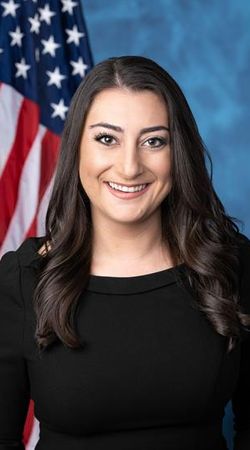Sara Jacobs
2023 - Present
2025
1
Sara Jacobs (Democratic Party) is a member of the U.S. House, representing California's 51st Congressional District. She assumed office on January 3, 2023. Her current term ends on January 3, 2025.
Jacobs (Democratic Party) is running for re-election to the U.S. House to represent California's 51st Congressional District. She is on the ballot in the primary on March 5, 2024.
Jacobs was a candidate for California's 49th Congressional District in the U.S. House. Jacobs lost the primary on June 5, 2018.
Biography
Sara Jacobs was born in San Diego, California. Jacobs earned a bachelor's degree in political science and a master's degree in international affairs from Columbia University. Her career experience includes working as a policy advisor with Hillary Clinton's 2016 presidential campaign; in policy positions with the U.S. State Department, UNICEF, and the United Nations; and the CEO of Project Connect. Jacobs founded San Diego for Every Child: The Coalition to End Child Poverty and served as the CEO of Project Connect.[1][2]
Committee assignments
U.S. House
2023-2024
Jacobs was assigned to the following committees:[Source]
2021-2022
Jacobs was assigned to the following committees:[Source]
- Committee on Foreign Affairs
- Africa, Global Health, and Global Human Rights
- International Development, International Organizations and Global Corporate Social Impact
- House Committee on Armed Services
- Military Personnel
- Seapower and Projection Forces
Key votes
- See also: Key votes
Ballotpedia monitors legislation that receives a vote and highlights the ones that we consider to be key to understanding where elected officials stand on the issues. To read more about how we identify key votes, click here.
Key votes: 117th Congress, 2021-2023
The 117th United States Congress began on January 3, 2021 and ended on January 3, 2023. At the start of the session, Democrats held the majority in the U.S. House of Representatives (222-213), and the U.S. Senate had a 50-50 makeup. Democrats assumed control of the Senate on January 20, 2021, when President Joe Biden (D) and Vice President Kamala Harris (D), who acted as a tie-breaking vote in the chamber, assumed office. We identified the key votes below using Congress' top-viewed bills list and through marquee coverage of certain votes on Ballotpedia.
| Key votes: 117th Congress, 2021-2023 | ||||||||
|---|---|---|---|---|---|---|---|---|
| Vote | Bill and description | Status | ||||||
|
||||||||
|
||||||||
|
||||||||
|
||||||||
|
||||||||
|
||||||||
|
||||||||
|
||||||||
|
||||||||
|
||||||||
| Not Voting |
|
|||||||
|
||||||||
|
||||||||
|
||||||||
|
||||||||
|
||||||||
|
||||||||
|
||||||||
|
||||||||
|
||||||||
|
||||||||
|
||||||||
|
||||||||
Elections
2024
See also: California's 51st Congressional District election, 2024
General election
The primary will occur on March 5, 2024. The general election will occur on November 5, 2024. General election candidates will be added here following the primary.
Nonpartisan primary election
Nonpartisan primary for U.S. House California District 51
Incumbent Sara Jacobs, Stan Caplan, Hilaire Shioura, and Bill Wells are running in the primary for U.S. House California District 51 on March 5, 2024.
Candidate | ||
 | Sara Jacobs (D) | |
 | Stan Caplan (No party preference) | |
 | Hilaire Shioura (No party preference) | |
 | Bill Wells (R) | |
 = candidate completed the Ballotpedia Candidate Connection survey. = candidate completed the Ballotpedia Candidate Connection survey. | ||||
| If you are a candidate and would like to tell readers and voters more about why they should vote for you, complete the Ballotpedia Candidate Connection Survey. | ||||
Do you want a spreadsheet of this type of data? Contact our sales team. | ||||
Withdrawn or disqualified candidates
- Saul Rodriguez (D)
Endorsements
Ballotpedia is gathering information about candidate endorsements. To send us an endorsement, click here.
2022
See also: California's 51st Congressional District election, 2022
General election
General election for U.S. House California District 51
Incumbent Sara Jacobs defeated Stan Caplan in the general election for U.S. House California District 51 on November 8, 2022.
Candidate | % | Votes | ||
| ✔ |  | Sara Jacobs (D) | 61.9 | 144,186 |
 | Stan Caplan (R) | 38.1 | 88,886 | |
| Total votes: 233,072 | ||||
 = candidate completed the Ballotpedia Candidate Connection survey. = candidate completed the Ballotpedia Candidate Connection survey. | ||||
| If you are a candidate and would like to tell readers and voters more about why they should vote for you, complete the Ballotpedia Candidate Connection Survey. | ||||
Do you want a spreadsheet of this type of data? Contact our sales team. | ||||
Nonpartisan primary election
Nonpartisan primary for U.S. House California District 51
Incumbent Sara Jacobs and Stan Caplan defeated Jose Cortes and Barrett Holman Leak in the primary for U.S. House California District 51 on June 7, 2022.
Candidate | % | Votes | ||
| ✔ |  | Sara Jacobs (D) | 60.5 | 91,329 |
| ✔ |  | Stan Caplan (R) | 37.2 | 56,183 |
 | Jose Cortes (Peace and Freedom Party of California)  | 2.2 | 3,343 | |
 | Barrett Holman Leak (D) (Write-in)  | 0.0 | 55 | |
| Total votes: 150,910 | ||||
 = candidate completed the Ballotpedia Candidate Connection survey. = candidate completed the Ballotpedia Candidate Connection survey. | ||||
| If you are a candidate and would like to tell readers and voters more about why they should vote for you, complete the Ballotpedia Candidate Connection Survey. | ||||
Do you want a spreadsheet of this type of data? Contact our sales team. | ||||
Withdrawn or disqualified candidates
2020
See also: California's 53rd Congressional District election, 2020
General election
General election for U.S. House California District 53
Sara Jacobs defeated Georgette Gómez in the general election for U.S. House California District 53 on November 3, 2020.
Candidate | % | Votes | ||
| ✔ |  | Sara Jacobs (D) | 59.5 | 199,244 |
 | Georgette Gómez (D) | 40.5 | 135,614 | |
| Total votes: 334,858 | ||||
 = candidate completed the Ballotpedia Candidate Connection survey. = candidate completed the Ballotpedia Candidate Connection survey. | ||||
| If you are a candidate and would like to tell readers and voters more about why they should vote for you, complete the Ballotpedia Candidate Connection Survey. | ||||
Do you want a spreadsheet of this type of data? Contact our sales team. | ||||
Nonpartisan primary election
Nonpartisan primary for U.S. House California District 53
The following candidates ran in the primary for U.S. House California District 53 on March 3, 2020.
Candidate | % | Votes | ||
| ✔ |  | Sara Jacobs (D) | 29.1 | 58,312 |
| ✔ |  | Georgette Gómez (D) | 20.0 | 39,962 |
 | Chris Stoddard (R)  | 13.0 | 25,962 | |
 | Janessa Goldbeck (D) | 8.5 | 17,041 | |
 | Famela Ramos (R) | 7.5 | 15,005 | |
 | Michael Oristian (R)  | 7.4 | 14,807 | |
 | Tom Wong (D) (Unofficially withdrew) | 3.6 | 7,265 | |
 | Annette Meza (D) | 2.2 | 4,446 | |
 | Joseph Fountain (D)  | 2.0 | 4,041 | |
 | Jose Caballero (D) | 1.6 | 3,226 | |
 | Joaquín Vázquez (D)  | 1.5 | 3,078 | |
 | John Brooks (D)  | 1.4 | 2,820 | |
 | Fernando Garcia (Independent)  | 0.9 | 1,832 | |
 | Suzette Santori (D)  | 0.8 | 1,625 | |
 | Eric Kutner (D)  | 0.4 | 734 | |
| Total votes: 200,156 | ||||
 = candidate completed the Ballotpedia Candidate Connection survey. = candidate completed the Ballotpedia Candidate Connection survey. | ||||
| If you are a candidate and would like to tell readers and voters more about why they should vote for you, complete the Ballotpedia Candidate Connection Survey. | ||||
Do you want a spreadsheet of this type of data? Contact our sales team. | ||||
Withdrawn or disqualified candidates
- Devorah Ann Fox (D)
- Zack Fields (D)
- Peter Sharma (D)
- Ashur Gabriel (R)
- Daniel Phillip Ferrara (D)
Candidate profile

Party: Democratic Party
Incumbent: No
Political Office: None
Biography: Jacobs founded San Diego for Every Child: The Coalition to End Child Poverty in 2018, serving as the organization's chairwoman. She also worked in policy positions at the U.S. State Department, UNICEF, and the United Nations. Jacobs was a policy advisor to Hillary Clinton during the 2016 presidential election. She received a bachelor's degree and a master's in international affairs from Columbia University.
Show sources
This information was current as of the candidate's run for U.S. House California District 53 in 2020.
2018
General election
General election for U.S. House California District 49
Mike Levin defeated Diane Harkey in the general election for U.S. House California District 49 on November 6, 2018.
Candidate | % | Votes | ||
| ✔ |  | Mike Levin (D) | 56.4 | 166,453 |
 | Diane Harkey (R) | 43.6 | 128,577 | |
| Total votes: 295,030 (100.00% precincts reporting) | ||||
 = candidate completed the Ballotpedia Candidate Connection survey. = candidate completed the Ballotpedia Candidate Connection survey. | ||||
| If you are a candidate and would like to tell readers and voters more about why they should vote for you, complete the Ballotpedia Candidate Connection Survey. | ||||
Do you want a spreadsheet of this type of data? Contact our sales team. | ||||
Nonpartisan primary election
Nonpartisan primary for U.S. House California District 49
The following candidates ran in the primary for U.S. House California District 49 on June 5, 2018.
Candidate | % | Votes | ||
| ✔ |  | Diane Harkey (R) | 25.5 | 46,468 |
| ✔ |  | Mike Levin (D) | 17.5 | 31,850 |
 | Sara Jacobs (D) | 15.8 | 28,778 | |
 | Douglas Applegate (D) | 13.1 | 23,850 | |
 | Kristin Gaspar (R) | 8.5 | 15,467 | |
 | Rocky Chávez (R) | 7.5 | 13,739 | |
 | Paul Kerr (D) | 4.4 | 8,099 | |
 | Brian Maryott (R) | 3.0 | 5,496 | |
 | Mike Schmitt (R) | 1.3 | 2,379 | |
 | Joshua Schoonover (R)  | 0.7 | 1,362 | |
 | Craig Nordal (R) | 0.6 | 1,156 | |
 | David Medway (R)  | 0.6 | 1,066 | |
 | Robert Pendleton (Independent)  | 0.5 | 905 | |
 | Danielle St. John (G) | 0.4 | 690 | |
 | Joshua Hancock (L)  | 0.3 | 552 | |
 | Jordan Mills (Peace and Freedom Party) | 0.1 | 233 | |
| Total votes: 182,090 | ||||
 = candidate completed the Ballotpedia Candidate Connection survey. = candidate completed the Ballotpedia Candidate Connection survey. | ||||
| If you are a candidate and would like to tell readers and voters more about why they should vote for you, complete the Ballotpedia Candidate Connection Survey. | ||||
Do you want a spreadsheet of this type of data? Contact our sales team. | ||||
Withdrawn or disqualified candidates
Campaign themes
2024
Ballotpedia survey responses
See also: Ballotpedia's Candidate Connection
Sara Jacobs has not yet completed Ballotpedia's 2024 Candidate Connection survey. Send a message to Sara Jacobs asking her to fill out the survey. If you are Sara Jacobs, click here to fill out Ballotpedia's 2024 Candidate Connection survey.
Who fills out Ballotpedia's Candidate Connection survey?
Any candidate running for elected office, at any level, can complete Ballotpedia's Candidate Survey. Completing the survey will update the candidate's Ballotpedia profile, letting voters know who they are and what they stand for. More than 15,000 candidates have taken Ballotpedia's candidate survey since we launched it in 2015. Learn more about the survey here.
You can ask Sara Jacobs to fill out this survey by using the buttons below or emailing info@sarajacobsforca.com.
2022
Sara Jacobs did not complete Ballotpedia's 2022 Candidate Connection survey.
2020
Sara Jacobs did not complete Ballotpedia's 2020 Candidate Connection survey.
Campaign website
| “ |
Fighting for Universal Health Care and Full Access to Reproductive Health Health care is a fundamental human right and we need to do everything we can to get to universal coverage. It’s an embarrassment that here in the United States we still don’t guarantee health care to all our people. Having travelled to many other countries, I’ve seen first-hand how universal coverage is an achievable goal, especially for the wealthiest country in the world. Many examples across the world show that a strong public role in health care can provide affordable, universal coverage. As such, I am proud to support Medicare for All. And I know that health care is about more than insurance. The system is rigged in favor of the big prescription drug companies, who can set whatever prices they want. I would work to make health care – not just health insurance – more affordable, by fighting to bring down out-of-pocket costs for things like co-pays and prescriptions, cracking down on drug companies for their runaway price increases, and holding insurance providers to account. We also need to de-stigmatize mental health and bring mental and behavioral health care on par with physical health care. We need more funding and training for primary care physicians, teachers, and school counselors to identify and support children facing behavioral or mental health challenges, and work with colleges to provide comprehensive mental health services. We need to make sure insurers are complying with mental health parity laws and increase the number of mental health providers around the country – particularly those who accept insurance. We need to ensure that anyone who suffers from substance use disorders gets the treatment and ongoing support that they need, rather than letting them face neglect and stigmatization. I firmly believe in every person’s right to have access to reproductive health services, and I also believe that if we want to support that access, we need more women – and members of the trans and gender non-conforming communities – at the table. We’ve seen what it looks like to have a room full of men legislate on reproductive health, and we’ve seen that women from both sides of the aisle are the ones who, time and again, demand that women’s health considerations be included in more broad health care and budget discussions. We need to ensure that low-income individuals have access to the reproductive health care services that they need by repealing the Hyde Amendment. And we need to codify Roe v. Wade into law so that we never have to worry about creeping state laws that in practice restrict a person’s ability to access their reproductive rights. We also need to focus on the United States’ high – and increasing – maternal mortality rate, especially among Black women, by funding implicit bias training among medical professionals, and extending Medicaid coverage to a full year after pregnancy. Building an Economy that Works for Everyone We have an unfair economic system that gives access to opportunity to some, while leaving so many others behind. When 39,000 military service members, veterans, and their families rely on the food banks in San Diego County every month, and 40 percent of San Diego’s children under 12 years of age are living in families under 200 percent of the poverty line, we know that our economy isn’t working the way it needs to. Make no mistake, the inequalities in our current economic system didn’t happen by accident. They are the result of a concerted, long-term effort by powerful special interests – and the Members of Congress they bankroll – to write the rules in a way that benefit themselves. There are a few things we can do to start to fix this: First, we need to roll back the harmful provisions in the Republican tax bill that are raising costs for middle-class families in California. Instead, we need a tax system that values labor and work as much as, if not more, than shareholders and passive income. Second, we need to do more to empower workers and grow wages and benefits. Every major corporation and industry has a team in Washington that works the halls of Congress every single day, looking for ways to tilt the scales in their favor in order to increase profits. The only counterbalance to that force – the only strong, reliable, and dedicated voice on behalf of working people in America – is organized labor. Virtually every protection that workers in America have, from pensions to paid family leave, tie back to the labor movement. We need more union jobs and more support for organized labor in America. We can accomplish that by making sure that workers are able to organize; standing against attacks on Davis Bacon, designed to protect contractors and subcontractors; and ensuring that Project Labor Agreements (PLAs) are built into federally funded projects. I support a national $15 minimum wage, protections for tipped workers, and passing the domestic workers bill of rights, so all workers are covered under our country’s labor laws. We also have to make sure that our seniors can retire in dignity. Twenty percent of seniors in California rely on Social Security for 90 percent or more of their income. As more and more people retire without the benefit of a pension, that number is going to grow. Two-thirds of workers don’t contribute to a 401(k), either because their employer doesn’t offer one or because they are living paycheck-to-paycheck. So, we have to protect, expand, and strengthen Social Security, not let Republicans treat it like a rainy-day fund. And finally, we need to make our economy more equitable and fairer overall. We need to make sure financial institutions are, at their core, serving their central purpose: investing in new businesses. That’s why I am interested in ways the Federal Reserve could incentivize greater capital to be made available to small- and medium-sized enterprises. Building a Workplace that Works for 21st-Century Families We need to get our workplaces more in line with 21st-century families. That means fighting to end the gender pay gap, which predominately affects African American and Latina women, across all industries. If I am elected to Congress, I will fight for greater salary transparency, including fighting for the full enforcement of Section 7 of the National Labor Relations Act, which makes it illegal for employers to prohibit the sharing of salary information, and to pass the Paycheck Fairness Act at the federal level. We also need to do more to compel employers, including government agencies, to intentionally raise wages for roles that are traditionally filled by women. We know that women take on more low-paid or unpaid caregiving roles and are more likely to request time off to support their families, all of which contributes to the gap we see in wages over time. We can help close this gap through government measures like tax credits and better benefits for caregivers. We also know that while wages for the middle class have largely failed to rise, the cost of raising a child has increased dramatically; for many, child care costs each month are roughly equal to the cost of rent or a monthly mortgage. And for many women, lack of affordable child care is a main barrier of entry into the workforce. As a Member of Congress, I will fight to set – and meet – a national goal to keep child care costs within 10 percent of a family’s annual earned income. To start, we need to invest in better payment assistance programs for families, pre-K for every child, more after-school options, and finally pass paid family leave and create a culture in which people of all genders take that time with their families. Addressing the Epidemic of Gun Violence I have been so inspired by the high school students from Parkland and across the country who have stood up against the NRA and are fundamentally changing the politics around gun violence prevention in this country. The majority of adults in the United States think that gun laws should be stricter, and yet, the gun lobby has used their money and our broken campaign finance system to stack Congress with their supporters, and block any possibility of reform, against the will of the people. But because of the activism of these students, we finally have a chance to pass common-sense gun violence prevention legislation. I support comprehensive federal background check legislation and more funding to enforce the laws. Everyone who purchases a gun in this country should have to undergo a criminal background check, regardless of where or from whom they purchase their gun, which means we need to close loopholes like the gun show loophole. I also support a federal gun licensing system, and background checks required on ammunition sales nationwide, similar to what was recently implemented here in California. And we need to hold gun manufacturers and gun store owners liable when their products are sold and used illegally. I also believe that we need to ban assault weapons. Military grade weapons have no place on our streets. We need better deterrence against illegal gun trafficking and guns passing through straw purchasers into the hands of those with criminal backgrounds, histories of violence, or serious mental illness, and we need to pass legislation to make illegal gun sales and handovers a federal crime. And while I support the Department of Justice’s amended ATF regulations that mandate bump stocks be subjected to the same federal regulations as machine guns, I also support including such a provision in federal legislation to prevent any future Department of Justice from reversing course. I am heartened that, in December 2019 – for the first time in more than two decades – Congress appropriated $25 million to the Centers for Disease Control and Prevention (CDC) and National Institutes of Health to study gun violence as a public health threat. As a Member of Congress, I will continue the push for additional funding. We also need to recognize the intrinsic link between gun violence and domestic violence. More than half of women murdered with guns are killed by family members or intimate partners. Analysis of mass shootings from 2009 to 2016 shows that 54 percent of mass shootings were instances of domestic violence. I support federal red flag laws, to allow the court to seize weapons from someone they deem a risk to themselves or others – and I support the reauthorization of the Violence Against Women Act (VAWA). I also support federal grants for community-based violence prevention programs to support communities that are disproportionately affected by gun violence. It’s time for Congress to stop playing politics with people’s lives and get to work to keep our communities safe. Fighting for DREAMERs and Immigration Reform Congress needs to immediately pass a clean DREAM Act. I believe we need to do everything we can to protect young people who arrived in this country when they were children. I also support a pathway to citizenship for undocumented residents and believe we need a comprehensive approach to immigration reform that moves us forward humanely and responsibly. I believe that any comprehensive approach should prioritize keeping families together and making sure businesses have the workers that they need while preventing them from abusing the visa system to outsource jobs. We need to fully resource our immigration courts and fix visa backlogs so that people can move through our legal immigration system without undue delay, especially focusing on the wait times for children of veterans from the Philippines who fought in World War II. We should set a goal of welcoming 95,000 refugees a year to our country and protect people who came here under Temporary Protected Status. I am also committed to bringing home our deported veterans. If you served this country, you should be able to live in this country. I also believe we can institute responsible, effective border security – not by building a wall, but by instituting measures that will actually increase efficiency and speed up transit across the border (which will also have the side effect of being good for our environment through reduced emissions). When the San Ysidro Port of Entry was closed last November in response to the “migrant caravan,” it was catastrophic for our economy and for Tijuana’s economy. After just five hours, the San Ysidro Chamber of Commerce estimated American businesses lost nearly $5.3 million. I believe it’s possible to have a safe and secure border that is also humanely enforced. That means that we should never separate children from their families nor put people unnecessarily in detention, and we must end the illegal metering of asylum applications and Remain in Mexico policy. And we need to resource and put in place programs for children who have experienced trauma because of the Trump Administration’s inhumane policies. We also need wholesale reform of our border and immigration enforcement agencies, re-focusing CBP on securing the border and focusing on drug and human trafficking, instead of interior enforcement. I believe we should also extend DOJ civil rights oversight to CBP. And we must end the for-profit immigrant detention industry once and for all. Creating More Affordable Housing and Addressing the Homelessness Crisis Everyone should have a home to sleep in. We know that having a home is the first step in accessing other needs – like safety, better health, work, and education. San Diego County has the fourth highest homeless population in the nation but often is around 20th in funding from the Department of Housing and Urban Development (HUD) – even with recent increases. So, part of addressing these issues is fighting for more robust federal funding to help end the region’s homelessness crisis, including through targeted investments to provide housing, outreach, and access to social services. As a representative of the 53rd District, I’ll also push for HUD to modernize their funding formula, which I believe will bring further grant funding into our district in support of proven programs to put homeless individuals into permanent housing and help them access the social services they need. I’ll work toward a consistent, government-wide definition of homelessness that takes into account what we know homelessness looks like in our community. And I’ll support federal programs that focus on preventing homelessness, like federal funding for legal counsel and providing emergency assistance in eviction courts. We know that San Diego County has a severe housing shortage. I will support and co-sponsor the American Housing and Economic Mobility Act, which leverages federal funding to build new housing units for low- and middle-income families by investing in a Housing Trust Fund, a Capital Magnet Fund to leverage private dollars, and a Middle-Class Housing Emergency Fund. And we need to strengthen the Low-Income Housing Tax Credit, and restore its value since the Republican tax bill gutted it. I will also co-sponsor the Rent Relief Act – which creates a refundable rental housing tax credit that would help individuals who live in rental housing and pay more than 30 percent of their income on rent – so that we are not unfairly penalizing renters in our tax code. And I would go even further and allow this tax credit to be directed to a tax-exempt savings account that can be used for a down payment to buy a home. I also support universal housing vouchers, so that anyone who is eligible for housing assistance receives it – instead of only 1 in 8 applicants, as is the case right now. But we know that more funding from the federal government will not solve the problem unless local governments change their zoning laws. So, I support new federal grants that require localities to reform land-use rules to be eligible, which can be used to build infrastructure, parks, roads, or schools. I also support inclusive zoning as a criteria for determining prioritization of new Community Development Block Grants (CDBG). And we also know that wealth derived from housing is a major contributor to the racial wealth gap – so I support no or low cost loans to families and individuals who live in formerly red-lined communities, and HUD-administered grants that provide down payment assistance to first-time homebuyers who live in historically red-lined communities. I believe Congress must continue to fund and improve federal programs to root out housing discrimination and make renting and owning a home more accessible and affordable. We need to resist the Trump Administration’s attempts to cut funding for HUD programs that directly reach our communities – like Section 8 rental vouchers, assistance for home buyers, and more. I’ll fight to protect and expand HUD funding for the 53rd District overall, and work to give more benefits to first-time and middle-class home buyers. Serving Military Members, Veterans, and Their Families Our military is the best-trained, best-equipped fighting force in the history of the world, and we should all be proud of those who serve in our Armed Forces. But it’s deeply concerning to me that even though we spend more on our military than the next eight countries combined, 39,000 service members, veterans, and their families in San Diego County have to rely on food banks every month to get by. I believe Congress needs to do more to make sure that our military budget is supporting members of our armed services and their families. There needs to be more support for families on military bases, with expanded child care and educational and career opportunities for military spouses. The children of our Armed Forces should receive a world-class education, no matter where they are. Across the board, we need to do more to support our military families – from continuing what the Obama Administration’s Joining Forces initiative started by making it easier for military spouses to retain their employment credentialing across state lines as they move. And by making the transfer schedule align with the school calendar, so kids don’t have to change schools mid-school year. I’ve spoken with military families across San Diego County about how the federal government can do more for military families, such as increasing access to free or highly-subsidized child care, both on base and off, and remaining committed to extended leave policies for new parents and family caregivers. I am also committed to bringing home our deported veterans. If you served this country, you should be able to live in this country. And we need to end the scourge of military sexual assault, by taking the decision to prosecute outside the chain of command and providing more services to survivors. The VA has struggled to modernize and keep up with the fast pace of medical innovation and the influx of patients since the wars in Iraq and Afghanistan. It is our duty to those who have served to make significant investments in modernizing the VA – employing enough staff and resources needed to end wait times, installing highly-skilled executive leadership, providing top-quality reproductive health care, and ensuring that mental health care and counseling are always available – while always protecting against Republican attempts to privatize the VA. As a country, we invest billions of dollars training and educating members of the military to be the best in their fields. As their military service concludes, it’s both our responsibility as a country as well as an economic necessity that we take the final step to help launch millions of talented veterans into successful careers. I am a big proponent of expanding and making permanent tuition assistance programs like the post-9/11 GI Bill so that veterans can complete an advanced degree or earn a certificate that will help them transition to a new kind of job without worrying about paying the family bills. And we must end the discriminatory and hateful ban on trans troops serving in the military. If you want to serve this country, you should be able to. As a Member of Congress, I will help root out discriminatory practices against veterans in hiring, education, and housing; fight for more funding for effective local initiatives working to find permanent homes for veterans experiencing homelessness; and legislate against deceptive practices at for-profit colleges. For instance, I support federal legislation to make GI Bill and Department of Defense Tuition Assistance funding part of the 90/10 rule, which requires for-profit colleges to collect at least 10 percent of tuition from sources other than federal aid. This would effectively eliminate the impetus for lower budget for-profit colleges to recruit veterans in order to count more DoD-funded tuition among that 10 percent. We need to both support and protect our veterans and military families from discriminatory practices. Protecting Our Environment and Transitioning to Clean Energy Climate change is one of the biggest threats faced by humanity, and we need to do far more to stop it. That’s why I support a Green New Deal. We need to transition to an entirely clean energy economy by 2030, starting with the most polluting sources of energy first. We need to make dramatic investments in clean energy – and in doing so, make sure clean energy jobs pay well and are good union jobs. And we must repair and upgrade our existing energy infrastructure to reduce pollution, save families money, and remain competitive in a 21st-century global economy. Congress must also maintain, establish, and fully enforce environmental regulations that protect our ecosystems, natural resources, and public health. Many of these laws control exposure to pollutants that disproportionately impact low-income individuals, families, and communities of color. We need to do far more for communities most impacted by the effects of climate change right now, which are often the communities that are most vulnerable for other reasons too. I will hold corporate polluters that are poisoning our kids and communities accountable and fight against offshore drilling. I have proudly signed the No Fossil Fuel Money Pledge and won’t accept a dime from oil, gas, and coal industry executives, lobbyists, or corporate PACs. And I will fight for the federal government to uphold our commitments to the Clean Air Act and Clean Water Act. Working in the Obama Administration, I saw the value and urgency of the Paris Climate Agreement and will push to re-enter it. We need to protect our environment and address climate change with the urgency it deserves. ANIMALS AND WILDLIFE As a policy advisor on Hillary Clinton’s 2016 presidential campaign, I consulted with experts to develop our policies and commitments to protect the welfare of animals and wildlife. I was proud to do this policy work on the campaign, and even prouder when I learned that it was the first time a U.S. presidential candidate had animal protections policy highlighted on their website. Those policies I helped develop, some of which live on as part of the Democratic Party platform, were designed to protect animals, lands, and wildlife. It includes policy to protect pets and domestic animals, protect farm animals from inhumane treatment, and end the slaughter of horses for human consumption and the painful practice of horse soring. We also committed to working to shutter the U.S. market for illegal wildlife products and combating international animal trafficking and poaching, which not only harms the environment, but also fuels terrorist activity. As a Member of Congress, I would uphold these commitments. I would also champion the promotion of humane animal treatment. In particular, I support legislation that helps women leave abusive partners and protect their pets. I’d also fight to make sure the next President enforces, funds, and keeps in place current protections for animals and wildlife. I’d work to close loopholes like those in the Marine Mammal Protection Act, and others designed to benefit the few and risk animals and their habitats. And we need to establish and enforce stronger regulations on puppy mills and other inhumane commercial breeding facilities. Our pets are members of our families, and wildlife are an important part of our ecosystem. I am currently the mom of a dog named Winston, and have had pets throughout my entire childhood. As a child, I volunteered at Free Flight Exotic Bird Sanctuary, Helen Woodward Animal Center, and beach clean ups, in addition to supporting conservation efforts and taking wildlife classes at the San Diego Zoo. I would bring this lifelong commitment to our environment, animals, and wildlife, which I know so many people in the 53rd District also share, to my work in Congress. Reclaiming Net Neutrality I was outraged by the FCC’s repeal of net neutrality through the hypocritically named Restoring Internet Freedom Order in July of 2018. One of the central tenets of the internet, and the reason it has led to so much innovation, is the free flow of ideas. Until recently, the United States had been a leader in advocating on behalf of this principle and against censorship by other governments. The Restoring Internet Freedom Order makes it harder for us to take a principled approach. First, the fact that it is widely known that bots and fake accounts flooded the public comment period, and no investigation was ever done, is negligent. Second, the only people who benefit from this decision are big internet service providers, who now can decide what you get to see, and for how much. Not only will this affect your bank account, it will affect your privacy and rights. I ran a non-profit that focused on extending equitable access to the internet and information to schools all over the world, and I’ve seen the harmful effects policies like this have on students. We have seen countries like Russia and China trying to create their own internet, with their respective governments deciding what information is suitable for public consumption and what it considers too dangerous. In the United States, we have seen the internet used in the last decade as a driver of social justice movements – from the #MeToo Movement to Black Lives Matter to those demanding a clean #DreamActNow. Allowing big internet service providers to determine who can start or access these movements and the free flow of ideas would be detrimental to our progress as a country. Supporting Public Education and Tackling Student Debt I was fortunate enough to attend some of the best public schools in the country here in San Diego, and I want to make sure every child has access to quality public education. In Congress, I’ll do everything I can to ensure students have a safe place to learn and educators have the training and resources they need to prepare students for the future. We need to adequately fund schools, and make sure we are doing it in a way that doesn’t exacerbate inequality. I believe that Congress must compel the Department of Education to continue implementing the Every Student Succeeds Act (ESSA), particularly the opportunities it provides to low-income students, students of color, English Language Learners, and students with disabilities. I oppose vouchers because they divert resources from our public school system. Further, we need to provide schools more support in helping immigrant students and families, including teacher and principal training aimed at supporting cultural and language diversity. I will also push to bring federal funding back to the 40 percent level that was promised in the Individuals with Disabilities Education Act, and work to ensure that funding actually reaches our schools. As a Member of Congress, I won’t supported federal mandates to our school system without providing schools with the requisite funding to implement them. I also believe the federal government should use Title I funding block grants to get states, which do the bulk of education funding, to create more equitable funding formulas. We also know that the community schools model, and school-based health centers (especially for mental health services), contribute significantly to closing the education outcomes gap, so I would invest federal funding in helping more schools to convert to that model. And I would make sure that the federal government creates laws so that for-profit education technology companies are not profiting off of our students’ data, and are adequately protecting the privacy rights of children. Next, we know that access to early childhood education is one of the most important steps in closing the opportunity gap – so I will push for universal Pre-K for 3- and 4-year-olds. We need to ensure every child has access to quality early childhood education so that they don’t start kindergarten already behind. Recently, California has made strides in expanding state funding for pre-K – but access to high-quality early education remains elusive for many families in California and across the country. I’ll push for significantly more federal funding for Head Start – including incentives for states to fund training and higher pay for educators. I also believe that all students should have the option to attend college debt-free. When my father attended UCSD in the late 1970s, it cost around $300 a quarter. Recently, tuition at California’s state universities has increased roughly 60 percent – and those same schools are admitting more out-of-state residents to shore up their finances, leaving deserving California students behind. We also have to address barriers to higher education that go beyond tuition – like the cost of books, housing, transportation, and food – that are often the reason that students are unable to complete their degree, even with financial aid. To make this a reality, I support expanding federal funding for Pell Grants and indexing that funding to inflation so that students receive enough funding to cover their education costs over time, as the Pell Grant Preservation & Expansion Act proposes. I support Department of Education trial programs to expand access to Pell funding, such as by allowing high school students to use Pell grants to earn credits at their local colleges after they finish their high school graduation requirements. I’m excited about the College Affordability Act that has passed the House. I also plan to explore policies to improve efficiencies, cut costs, and raise graduate rates at colleges and universities. We also need to reign in unfair practices that drive up costs for students, such as deal-making between institutions and firms that supply necessities like textbooks, on-campus child care, transportation, and other campus services. And we need more oversight and accountability of for-profit colleges, that often target low-income students without providing them pathways to better jobs or increased earnings. I will champion more federal funding for college scholarships, particularly for student parents and students of color, and I’ll advocate for Minority-Serving Institutions. We can also broaden opportunities for students through tuition-free community college and by supporting more career and technical training, including and especially for teachers. We need more incentives, like tax credits, for companies that create apprenticeship programs for students and hire recent graduates, and incentivize more institutions to partner with local schools to create specialty degrees and foster diverse talent from a range of educational backgrounds. We need to expand internship opportunities across the board as well as financial support for students who can’t afford to take an unpaid internship. And we can’t forget young people currently struggling to pay off student debt. I will advocate for programs to help refinance debt to lower interest rates; allow those in bankruptcy to discharge student debt; and provide more debt forgiveness options for young people doing their best to open a business, invest in innovation, and improve their communities, whether through teaching, caregiving, or other forms of public service, by expanding the Public Service Loan Forgiveness Program. CRIMINAL JUSTICE REFORM Everyone, regardless of their political beliefs, wants a society that is just, and where laws are applied equally to everyone. To achieve that reality, we need to refocus our criminal justice system on the offenders that create the most damage – white collar crime, the leaders of crime syndicates, and the like. And we must prioritize rehabilitation and treatment over prison for low-level and nonviolent drug offenses and work to end the era of mass incarceration. We need laws that make racial profiling illegal, provide police departments with body cameras, and support training on use of force and de-escalation techniques. We also need to dismantle the school-to-prison pipeline by changing mandatory minimum sentences for non-violent, low-level drug arrests, devoting greater resources and training to treatment and rehabilitation, and reforming school disturbance laws to emphasize intervention rather than detention or arrest. I support federal legislation to enable people returning from prison to re-enter society more easily, from encouraging companies and organizations to hire and invest in these individuals to fully restoring their voting rights. California is currently one of only 22 states that allows formerly incarcerated individuals to register to vote after their incarceration, probation, and parole are completed. States that add conditions to the reinstatement of voting rights – and states like Iowa and Kentucky, which have implemented lifetime bans on the voting rights of formerly incarcerated individuals – further contribute to the racial divide perpetrated by our criminal justice system. In fact, African American citizens are four times more likely to face disenfranchisement; 1 in 13 African American citizens of voting age are currently prohibited from voting due to felony convictions, compared to 1 in 40 Americans overall. We urgently need to address a racist justice system in which Latinx and African American people are still far more likely to be profiled, stopped by police, and sentenced to longer prison terms than white people. Once elected, I will proudly sponsor legislation in the House similar to the Senate’s Harris-Paul bill that incentivize states to reform their systems of “money bail” and the Senate’s Booker-Blumenthal legislation that would incentivize states to reduce their prison populations and get rid of private prisons. We also know that, for too long, Congress has operated under outdated norms related to cannabis that continue to punish already vulnerable populations and waste taxpayers money on enforcement. It’s time for the federal government to de-criminalize cannabis. And we need to make sure that tax money derived from legal cannabis sales go back to rebuilding communities that have been devastated by the drug wars, and that we pardon all those who are in the criminal justice system due to non-violent marijuana-related offenses that would now be considered legal. Finally, we know that the laws themselves are not the only problem; the application of the law is also where inequity happens. It is imperative that we find ways to fix the procedural issues that cause so much harm in our criminal justice system. Supporting Zero-Tolerance for Harassment and Abuse I’m glad that women’s voices are finally being heard, but I didn’t need the #MeToo movement to know that sexual harassment in the workplace was a problem. As a young woman, I’ve experienced it myself. We need a zero-tolerance attitude towards sexual harassment and assault – in all facets of our society, and at all levels, but especially in our politics. Our elected leaders write and pass legislation affecting millions of lives, including those of women, and serve as an example to our children of what we value as a society. If our leaders don’t respect women in their own lives, we certainly can’t count on them to make policy that will uphold women’s dignity and rights. We need to protect young people on college campuses and in our Armed Forces, so they can receive a quality education and serve our country without having their safety violated. And statistically, low-wage workers are the most susceptible to workplace harassment, and the risk of losing an income often prevents individuals from coming forward. Nearly two-thirds of Black and Latina women reported experiencing racial discrimination at work. To start, we must pass the domestic workers bill of rights, so that we can ensure that all people are protected from sexual harassment in the workplace. We have an opportunity to build on the #MeToo movement and root out sexual harassment and discrimination across our workplaces and institutions. Congress should pass the Fair Employment Protection Act to restore protections for individuals who experience harassment from a supervisor and incentivize employers to work toward better prevention methods and timely follow up when harassment is reported. We also have an opportunity to go even further and set a goal as a country to create workplaces that reject aggressive, discriminatory behavior and empower employees to look out for one another. For instance, office prevention programs that provide training for bystanders on how to report or intervene when they see harassment happening have been found to reduce incidents overall. And as a Member of Congress, I commit to being an ally to anyone experiencing sexual harassment. We need to make clear to the leaders of the future that touching a person without their consent is an unforgivable offense. Every candidate who vies for higher office has to see and treat women as equal members of our society. I’m glad that Congress updated rules for its own conduct, but we have so much more work to do to ensure Members of Congress are living up to their leadership responsibilities. The rate of domestic abuse in our country is heartbreaking and it disproportionately impacts women of color, and trans women of color most of all. That’s why I will fight to make it harder for domestic abusers to own firearms, so we can prevent assaults from turning into deadly and tragic events, including crafting legislation that would require anyone with a temporary restraining order to forfeit their firearm, and closing the “boyfriend loophole” which allows domestic abusers who are boyfriends to keep their guns in the case of a protective order. And we need more provisions so that people fleeing from domestic abuse get the services that they need, and don’t experience homelessness as a result. Making Government Actually Work Our government should represent all of us – not just wealthy special interests. We need to ensure government is transparent, by requiring the public disclosure of political spending. We need to update disclosure requirements for online political advertising to apply the same rules as TV, radio, and satellite ads. And companies should have to disclose their political spending to shareholders. I also support encouraging more participation in our democracy by supporting small dollar matching programs. And most importantly, we need to prevent corporations from having unlimited sway over our elected officials – which is why I support a Constitutional Amendment to overturn Citizens United. I support legislation that prohibits federal registered lobbyists from contributing to or bundling for federal campaigns, and strengthening the definition of who must register as a lobbyist. I believe that no Member of Congress should receive contributions from industries that are regulated by the committees on which they sit, and I believe that Members of Congress should be banned from becoming lobbyists after leaving office. I’m also operating under the policies I support: my campaign will not accept any corporate donations or contributions from federal and corporate lobbyists. And I pledge to publicly post my official schedule as a Member of Congress. And I’m committed to innovating and modernizing the way Members of Congress interact with their constituency and finding ways to bring more people into the policy-making process – through deliberative democracy and participatory processes. We have new technologies and tools that enable us to reach out to people in a different way, and it is well past time we use them. Fighting for Equality for our LGBTQ+ Siblings As someone with both a gender-nonconforming sibling and a trans sibling, issues affecting the LGBTQ+ community are deeply personal to me. We know the fight for equality didn’t end at marriage. In 30 states, it’s still legal to fire someone because of their sexual orientation or gender expression. And there is an epidemic of violence against trans women of color. In Congress, I will fight for all of our siblings, including my actual siblings, to have equal protection under the law. I will fight to ensure the Equality Act becomes law, so that no one can be fired or denied public housing and other government services because of their sexual orientation or gender identity. I support the Do No Harm Act, so that the important religious freedom protections that we have cannot be used to harm LGBTQ+ people. And I support ending the practice of conversion therapy once and for all. I will also work to ensure that we adequately fund the federal Offices of Civil Rights to have the resources to enforce protections for LGBTQ+ people, and I will ensure that HUD and EEOC have the resources they need to quickly respond to and investigate complaints that they receive about discrimination against the LGBTQ+ community. We know that LGBTQ+ youth are uniquely susceptible to bullying and depression. So, we need to pass the Safe Schools Improvement Act, to ensure that schools are enacting codes of conduct that specifically prohibit bullying and harassment; and the Student Non-Discrimination Act, that protects students from being discriminated against for their gender or sexual orientation in any federally funded programs and institutions. We also need to do more to help train teachers to spot when a child is being bullied because of their gender identity or sexual orientation. And we need to increase funding for school-based mental health services. We know that around 40 percent of homeless youth are LGBTQ+, and that trans people experience vastly higher than average rates of homelessness and housing insecurity. So, as we work to end our homelessness crisis, we must make sure that any shelter that receives federal funds does not discriminate against LGBTQ+ people, particularly youth, and accommodates trans people in a way that aligns with their gender identity. We must expand federal initiatives to end youth homelessness and reauthorize and fully fund the Runaway and Homeless Youth and Trafficking Prevention Act. We need to ensure that everyone has access to the physical and mental health care that they need. We need to pass legislation that addresses key risk factors for LGBTQ+ deaths by suicide, particularly for LGBTQ+ youth. We need to expand access to PrEP and align federal HIV-specific criminal laws with our current scientific understanding of HIV. We need to ban medically unnecessary genital surgeries on intersex infants and children. And we need to make sure that all trans people have access to gender affirming care. In 2018, the Human Rights Campaign Foundation and the Trans People of Color Coalition counted 26 incidents of fatal transgender violence. And this rate of violence has only continued in 2019. We must end this epidemic of violence against the trans community, especially trans women of color. I support the compilation of disaggregated crime statistics so we can better understand the problem and how to help solve it, and I support increasing funding for law enforcement training on cultural competency and how to identify and respond to these issues. And we need to ensure that when trans people are incarcerated, which they are at a much higher rates than average, they are incarcerated in a way that is safe and respectful of their gender identity. I’ve seen firsthand the hurt and pain that can be caused by misgendering someone. And how easy it is to be an ally by taking the extra time to normalize sharing your pronouns. That’s why I support ensuring that it is easy to access federal identity documents with the pronouns you identify with. I am using my platform to educate people about correct pronoun usage and am striving to use gender-inclusive language throughout my campaign. It is long past time that we ensure that all members of our community have access to opportunity, no matter whom they love or how they identify. Modernizing and Investing in Infrastructure and Transit We need to vastly increase our federal investment in our nation’s infrastructure and ensure that any infrastructure bill includes provisions on PLAs and prevailing wage. We know that we need more funding for modernizing and building schools, increasing mass transit, extending internet connectivity and rural broadband, rebuilding our crumbling highways and bridges, retrofit existing projects to be more energy efficient, and ensure we have the highest quality water infrastructure. To do that, I believe the federal government should invest $650 billion directly in needed infrastructure projects and create a national infrastructure bank that leverages public dollars with private investment. And we know that more funding alone will not solve the problem. We also need to modernize the public evaluation framework for projects to ensure they take into account the latest research. We need to ensure projects are selected based on impact, not politics. And we need to streamline permitting, break down silos that limit funds to a single type of transportation, and encourage 21st century design and technology. We should also explore merit-based competitive grants instead of handing money directly to state governments. Rebuilding America’s Leadership Role in the World I believe that the United States can play a leadership role in the world, ensuring that Americans are safe and secure and that we are working to make the world more peaceful. I also believe that in 2021, we will have a very unique opportunity to rebuild our foreign policy and national security architecture after Donald Trump’s complete decimation of it. That means re-entering the Paris Climate Accords and treating climate change with the urgency it deserves, rebuilding and funding our State Department and USAID, and re-focusing our Defense Department to the threats of the future, instead of fighting yesterday’s wars. It is well past time that Congress stops abdicating its role in our national security. I support repealing the 2002 AUMF which authorized the Iraq War, a clear mistake, and amending the 2001 AUMF to a new time-limited one that authorizes the use of military force in specific countries against specifically named groups while enhancing congressional oversight and public transparency. We need to end the forever wars – America’s involvement in Iraq, Afghanistan, and fighting terrorism around the world – and we need to do it responsibly. We’ve seen successful peacebuilding and conflict stabilization interventions in other places and we need to take the lessons that we learned from those experiences and make sure that we are funding a day after plan for leaving, just as we should have funded a day after plan for intervening in the first place. I know that development and diplomacy are the most important foreign policy tools that we have. So, not only do we need to protect and maintain current funding levels for the State Department and USAID, we need to drastically re-balance our approach to foreign policy to give enough resources and emphasis to these agencies.[26] |
” |
| —Sara Jacobs 2020 campaign website[27] | ||
Notable endorsements
This section displays endorsements this individual made in elections within Ballotpedia's coverage and endorsements scopes.
See also
2024 Elections
External links
|
Candidate U.S. House California District 51 |
Officeholder U.S. House California District 51 |
Footnotes
- ↑ Sara Jacobs for Congress, "Meet Sara," accessed April 19, 2021
- ↑ Congresswoman Sara Jacobs, "Biography," accessed November 18, 2022
- ↑ Congress.gov, "H.R.3684 - Infrastructure Investment and Jobs Act," accessed April 15, 2022
- ↑ Congress.gov, "H.R.1319 - American Rescue Plan Act of 2021," accessed April 15, 2022
- ↑ Congress.gov, "H.R.5376 - Inflation Reduction Act of 2022," accessed January 20, 2023
- ↑ Congress.gov, "H.R.3617 - Marijuana Opportunity Reinvestment and Expungement Act," accessed January 20, 2023
- ↑ Congress.gov, "H.R.1 - For the People Act of 2021," accessed April 15, 2022
- ↑ Congress.gov, "H.R.1808 - Assault Weapons Ban of 2022," accessed January 20, 2023
- ↑ Congress.gov, "S.1605 - National Defense Authorization Act for Fiscal Year 2022," accessed April 15, 2022
- ↑ Congress.gov, "H.R.7776 - James M. Inhofe National Defense Authorization Act for Fiscal Year 2023," accessed January 20, 2023
- ↑ Congress.gov, "H.R.6 - American Dream and Promise Act of 2021," accessed April 15, 2022
- ↑ Congress.gov, "S.3373 - Sergeant First Class Heath Robinson Honoring our Promise to Address Comprehensive Toxics Act of 2022," accessed January 20, 2023
- ↑ Congress.gov, "H.R.4346 - Chips and Science Act," accessed January 20, 2023
- ↑ Congress.gov, "H.R.3755 - Women's Health Protection Act of 2021," accessed April 15, 2022
- ↑ Congress.gov, "H.R.1996 - SAFE Banking Act of 2021," accessed April 15, 2022
- ↑ Congress.gov, "H.R.2471 - Consolidated Appropriations Act, 2022," accessed January 20, 2023
- ↑ Congress.gov, "H.R.5 - Equality Act," accessed April 15, 2022
- ↑ Congress.gov, "H.R.8404 - Respect for Marriage Act," accessed January 20, 2023
- ↑ Congress.gov, "H.R.6833 - Continuing Appropriations and Ukraine Supplemental Appropriations Act, 2023," accessed January 20, 2023
- ↑ Congress.gov, "H.R.7688 - Consumer Fuel Price Gouging Prevention Act," accessed January 20, 2023
- ↑ Congress.gov, "H.R.8 - Bipartisan Background Checks Act of 2021," accessed January 20, 2023
- ↑ Congress.gov, "H.R.5746 - Freedom to Vote: John R. Lewis Act," accessed January 20, 2023
- ↑ Congress.gov, "S.2938 - Bipartisan Safer Communities Act," accessed January 20, 2023
- ↑ Congress.gov, "H.Res.24 - Impeaching Donald John Trump, President of the United States, for high crimes and misdemeanors.," accessed April 15, 2022
- ↑ Congress.gov, "H.R.2617 - Consolidated Appropriations Act, 2023," accessed January 20, 2023
- ↑ Note: This text is quoted verbatim from the original source. Any inconsistencies are attributable to the original source.
- ↑ Sara Jacobs 2020 campaign website, "Issues," accessed February 8, 2020
| Political offices | ||
|---|---|---|
| Preceded by Juan Vargas (D) |
U.S. House California District 51 2023-Present |
Succeeded by - |
| Preceded by Susan Davis (D) |
U.S. House California District 53 2021-2023 |
Succeeded by - |









